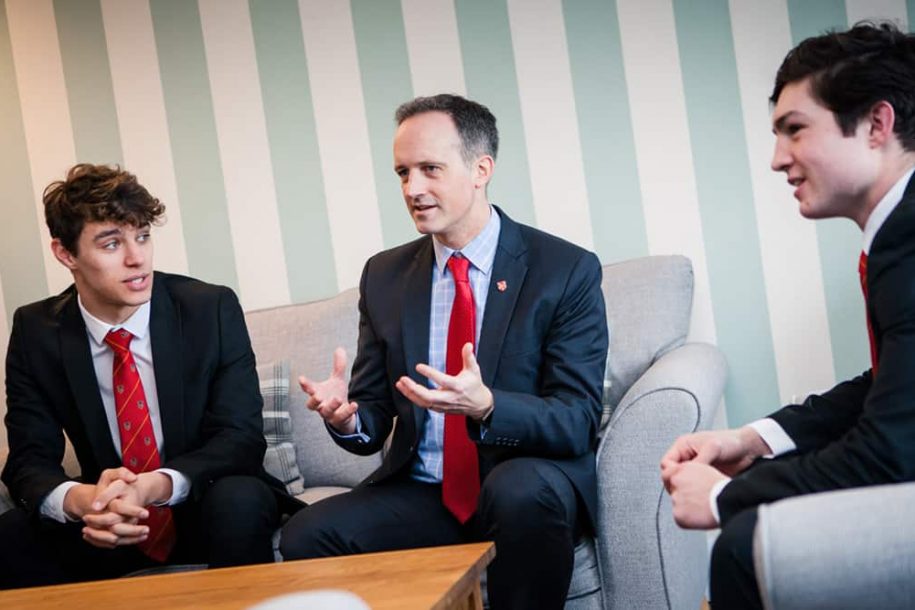The best of Intentions

The start of a new academic year is a wonderful opportunity for self-improvement. Personally, I have set myself a professional and a personal new year’s resolution: firstly to carve out a weekly diary slot for reviewing the latest research into teaching and learning; and secondly to ignore the dessert counter in the School lunch hall. I have lost count of the number of conversations I have had with our older pupils about their intentions to ‘turn over a new leaf’ so that they can fulfil their exam and university ambitions. In addition, starting the year well has naturally been the subject of some of our initial assemblies, whether that’s in connection with improved study habits, the creation of healthy relationships with teachers and peers, or the determination to seek new experiences in the co-curricular life of the School. What then might you be saying as parents to help your son be the very best version of himself during the coming academic year?
The answer to this question depends, of course, on his stage of education. For our new boys in Years 6 and 7, it’s all about coming to terms with routine in a much larger school with different expectations. Helping your son to pack his bag in the evening with the books he needs for the next day’s lessons will help him to improve his planning skills whilst eliminating the temptation to carry all the books he has been issued every single day! The other area for Year 7s is the management of homework, which is new to many of our boys, certainly in terms of receiving three subjects per day. Our youngest boys are very keen to please and are likely to over-complicate matters, copying out reams of text needlessly. There is a balance to be found between high standards (positive) and perfectionism (negative), and you may need to help your son see the wood for the trees. Spending too much time on homework will be counter-productive as he will become too tired as term progresses to focus properly in school.
Of course, as boys move into Year 8 and beyond, your problem may be the exact opposite: too little time spent on homework, with your son tempted by shortcuts and adopting a minimalistic approach. The beginning of the year is an opportunity to help boys of all ages find the ideal conditions for their schoolwork. Firstly, ensure that your son has a designated work area at home (bedroom, dining room etc.) where all of his equipment is readily to hand so that time is not wasted looking for what he requires. Again, can a routine be created where the first subject is done as soon as he gets home, with the reward of a snack and a short break to follow before continuing with the second piece of work? Encourage him to keep hydrated; it’s reassuring to see so many boys carrying a water bottle in school – we think that the message has been understood!
Please don’t accept the “I’ve done it on the bus” approach. A little reading on the bus to consolidate learning in class is acceptable, but quality homework will only come if he has a regular routine in conditions where he can focus 100% on the task at hand. Finally, insist on a quiet environment free from distractions (very few people can work effectively with music blaring out) and encourage your son to leave his electronic devices outside the homework room. It’s very easy for a boy to argue that he can’t do his homework without the Internet, but the reality is often different. His exercise book and textbook are usually the best resources. Although he may start by using his phone to look up a relevant piece of information, I can guarantee that most boys will soon move on to YouTube, social media or aimless surfing.
For boys from Year 10 upwards, the focus at the beginning of the academic year needs to be more on homework quality than merely effective routines. Once GCSE courses have started, boys need to be engaging critically with their subject matter. Crucially, this means being honest with themselves if they have not truly understood what they have studied in class. As your sons get older, it becomes less and less likely that they will tolerate what they perceive as ‘interference’ by micro-managing their homework. Indeed, even if you have a compliant son who would be happy accounting for every single task completed, I urge you not to persist in ‘helicopter parenting’ once the serious business of public examinations has started. He needs gradually to discover an independence that will sustain him through GCSE, A Level and beyond. Instead, can you engage him in mature conversation about what he has learned? Often when material is hard, boys prefer to ignore the problem, hoping that when they return to the topic months later, they will miraculously understand. One of the most useful things you can attempt with an older son is persuading him that he needs to seek more help from his teacher, and then checking back with him that the necessary conversation has actually taken place.
Whatever the unique needs of your son at this point in his education, please find the time to chat with him during the next week or so about his resolutions. Form tutors are focused much more this year on helping boys set targets. We will help him identify suitable goals. Whatever you can do to help him live up to his good intentions will be of inestimable benefit.
